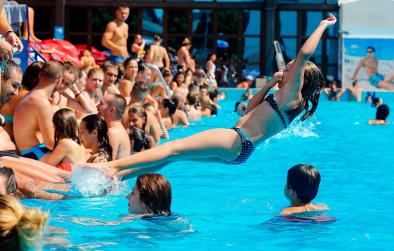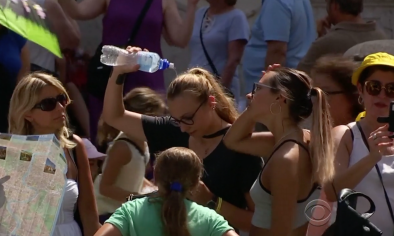'Lucifer' heat wave holds Italy, eastern Europe in fiery grip

Swathes of southern and eastern Europe sweltered in temperatures above 40 degrees Celsius (104°F) on Friday in a heat wave nicknamed "Lucifer" that has fanned forest fires, triggered weather warning alerts and damaged crops.
Italy and the Balkans were worst affected, though areas as far north as southern Poland also basked in abnormally hot temperatures, and European weather hub Meteoalarm issued its highest grade "red" warnings for 10 countries.
At least two people have died from the heat - one in Romania and one in Poland - and many more have been taken to hospital suffering from sunstroke and other heat-related conditions.
In Albania, 300 firefighters and soldiers struggled to contain as many as 75 forest fires and the country asked the European Union for emergency help.
Firefighters were also busy in Serbia, Bosnia, Macedonia and Croatia, and authorities advised people to stay indoors and increase their water intake. Temperatures were expected to stay around 40 degrees Celsius into next week.
Wine growers in Italy have started gathering the grape harvest weeks earlier than usual due to the extreme heat.
Carlo Petrini, founder of the Slow Food movement, wrote in La Stampa newspaper that the grape harvest had never started before Aug. 15 in living memory.
...
Italian authorities have issued weather risk warnings for 26 cities, including tourist hubs Venice and Rome, where many of the fountains have been turned off due to a lengthy drought.
The world-famous Uffizi art galleries in Florence had to shut temporarily on Friday when the air conditioning system broke down, their director told ANSA news agency.
...
In Hungary, keepers at Budapest Zoo provided huge ice blocks to cool down two polar bears, who were also fed ice-cold water melon.
Bosnian officials said the heat wave and drought had nearly halved agricultural output, which accounts for 10 percent of the country's economic output. Neighboring Serbia reported a similar situation and experts said drought could slash corn and soybean production by a third.
Related Content






